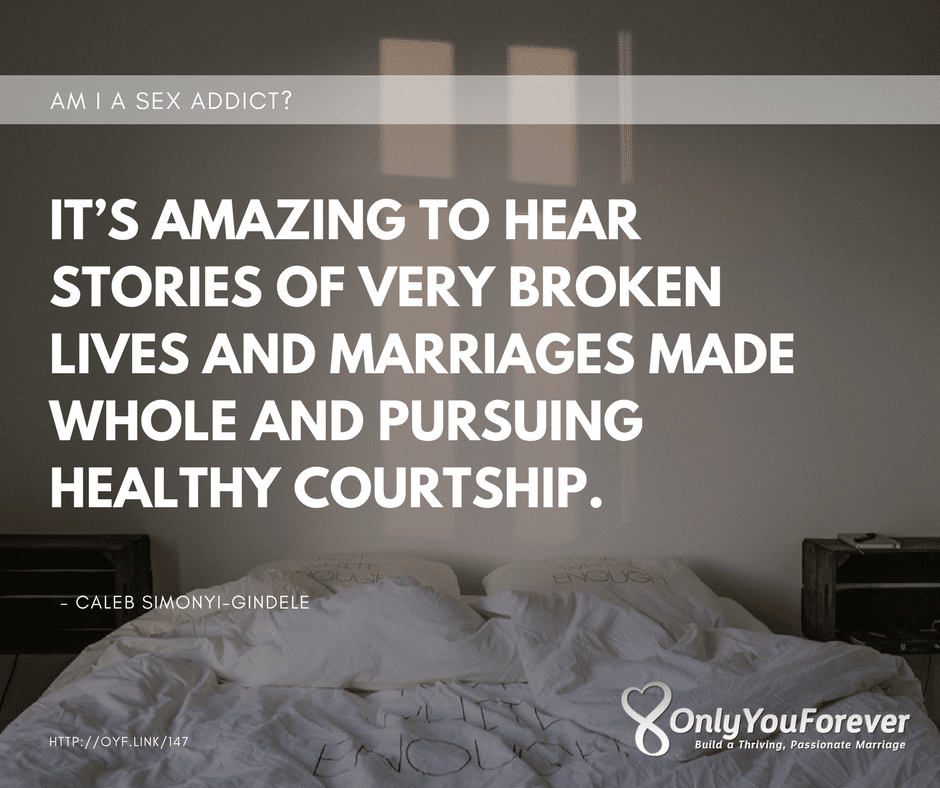I recently completed 4 and a half days of training on the assessment and treatment of sex addiction. You might be thinking “I’m not a sex addict so this isn’t relevant”, but I’d encourage you to listen to this week’s podcast regardless because we’ll also talk a lot about what healthy sexuality looks like in this show. There’ll be plenty of food for thought whether this is an issue in your marriage or not.
What Sex Addiction Is and Is Not
To begin with, let’s clarify what we’re talking about with “sex addiction”. It is not:
- A high desire or couples that enjoy a lot of sex. We need to differentiate compulsive vs. healthy sex:
- Compulsive: using genitals to avoid feelings. Intimacy: closeness and affection are enhanced through sex
- Compulsive relationships are marked by loneliness, possessiveness, jealousy, anger, and alienation. Healthy intimacy affects the growth of both individuals
- Healthy courting and bonding is an honest, slow process. There’s no ‘game’ in the courting process.
- I’ve never heard mention of a couple who are sexually addicted to each other
- Sex addiction is not necessarily porn addiction.
- Sex addiction is not necessarily sex offending — although a lot of sex offenders are also sex addicts.
So what IS sex addiction? There are 10 criteria:
-
-
- Loss of control over your actions
- Compulsive behavior
- Efforts to stop
- Loss of time to your addiction
- Preoccupation with sex and sexual thoughts
- Inability to fulfill obligations due to your addiction
- Continuation in the addiction despite negative consequences
- Escalation- behavior continually getting more extreme to satisfy cravings
- Losses due to the negative consequences of addiction
- Withdrawal
-
Differences between Addictive and Healthy Sexuality
| Addictive Sexuality | Healthy Sexuality |
| Feels shameful | Fosters positive self-worth |
| Is illicit, stolen or exploitative | Has no victims |
| Compromises values | Operates within a value system |
| Draws on fear for excitement | Uses intimacy for excitement |
| Reenacts childhood abuse | Cultivates a sense of being an adult |
| Disconnects from oneself | Fosters a sense of self |
| Creates a world of unreality | Expands reality through being in touch with the present |
| Is self-destructive and dangerous | Relies on safety |
| Uses conquest or power | Is mutual, consensual, and equal |
| Serves to medicate and kill pain | Fosters self-regulation of emotions |
| Is dishonest or requires a double life | Originates in integrity and authenticity |
| Becomes routine, grim or joyless | Is spontaneous, fun and playful |
| Demands perfection | Accepts the imperfect |
| Suffocating, demanding, clinging or disengaged | Is respectful of boundaries, accepting and intimate |
Causes of Sex Addiction
- Family backgrounds:
- Families of origin for sex addicts are characteristically rigid (77% of addicts) and disengaged (87%)
- Addicts in the family (87%)
- Childhood issues
- Emotional abuse: 97%
- Sexual abuse: 81%
- Physical abuse: 72%
So the family and upbringing play a huge part in almost all cases. A lot of the recovery work involves addressing childhood trauma.
- Pornography is a catalyst or portal to amplify sex addiction.
- I like to see it as a very broken way of coping with pain from trauma, abuse, neglect, etc. The addict absolutely must take responsibility for all of their choices — but there are significant, tragic things that have happened in their lives that have made them vulnerable to these choices in a way that those of use without those experiences are not going to be nearly as vulnerable.
Treatment for Sex Addiction
- Is there hope for sex addicts?
Yup. It’s amazing to hear stories of very broken lives and marriages. So much destruction and pain. Now they are whole and their lives are manageable and they are pursuing healthy courtship and healthy intimacy.
- What about their spouses?

Coping with a spouse who is addicted to sex can be very challenging. Dealing with these issues can be similar to dealing with trauma and Post Infidelity Stress Disorder, both of which we have looked at in previous episodes. Disclosure should be professionally guided if there is a lot of addictive behavior to deal with.
- What does treatment look like?
It depends on the severity but where you have total unmanageability and basic counseling hasn’t helped it’s time to consider an inpatient program lasting several weeks. Then follow up work. I’m hearing of recovery treatment lasting 3-5 years and then after that, there is a lifetime of maintenance behaviors and habits, including being part of a SA group of some sort.
Listen to the podcast for the full discussion.
Podcast: Play in new window | Download (Duration: 26:32 — 24.7MB)
